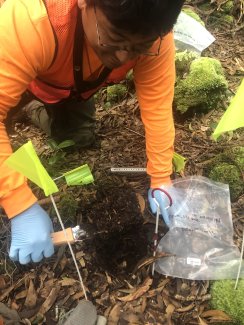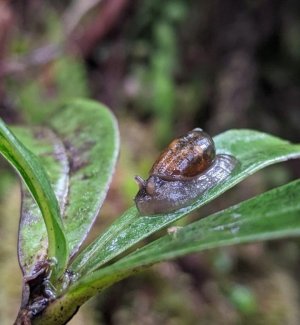Spotlight
Voices in Ecology – Shea Uehana, NEON Domain 20
November 18, 2021
The practice of inclusivity in the sciences ensures that all backgrounds, experiences, and perspectives have a voice in the community. Widening the range of voices being heard in the pursuit of scientific knowledge and discovery is more important than ever.
In a new blog series, we aim to champion the invaluable contributions of diverse scientists across NEON and the U.S. in expanding the bounds of ecological research. We recently asked Hawaii-born NEON Senior Field Ecologist Shea Uehana to share about his work with the ecological project, his path into the field of ecology, and how his background informs his current work.
Can you tell us a bit about your work with NEON, and your career path?
I have been a Senior Field Ecologist in charge of NEON's Terrestrial Observations System (TOS) protocols for the program's Pu'u Maka'ala Natural Area Reserve site (PUUM) in Domain 20, in Hilo, Hawaii since 2018. I applied for this job while I was writing my Master's thesis for the University of Hawaii at Hilo's Tropical Conservation Biology and Environmental Science program. Prior to that, I had been working in the field of conservation since graduating with a B.S. in Environmental Science in 2012.

Shea Uehana sampling soil microbes at the PUUM field site, D20
In between earning my B.S. degree and beginning at NEON, I held several other roles in ecology, including volunteering at Hawaii Volcanoes National Park, an internship at the USDA Forest Service, and as a research assistant for Dr. Patrick Hart at University of Hawaii Hilo.
What inspired you to become involved in your current field?
I grew up on the Island of Hawaii, and a large part of my childhood was fishing and hunting with friends and family. Even with no science background, I could see all kinds of change taking place both on land and in the sea. The degradation of the Hawaiian forest and reef ecosystems that I often visited was alarming to me even as a teenager. I knew early on that I wanted to work outdoors and help the conservation effort in some way.
Does local culture and tradition play a role in your regular work life?
In general, I guess the melting pot of cultures in Hawaii has resulted in being a member of a diverse crew. I feel like we all walk away from a field season knowing quite a bit more about each other's cultures.
The forest we work in is also a remarkably intact native ecosystem, and almost every plant or bird has cultural significance in the oral traditional Hawaiian lore. As such, we treat everything with respect.
Who were your most important influences/mentors in ecological science?
My graduate advisor Dr. Patrick Hart. Dr. Jonathan Price, who was one of my professors in undergraduate and later my graduate committee. Dr. Rebecca Ostertag also had a major impact on me.
Did you ever experience challenges getting into STEM fields?
The biggest challenge was just getting started. In the months leading up to my undergraduate graduation, I scoured the job listings and talked to everybody I knew, but there just weren't any entry level jobs. Two to four years was the minimum experience required for every listing I came across, and I was fresh out of college with just a few months of relevant experience all told.
How do you think research and educational institutions could inspire underrepresented groups to study fields in ecology?
Focused outreach and early work experience opportunities would help.

A Succineid snail at PUUM
What is the most satisfying part of being an ecologist? What is the most challenging?
The most satisfying thing is seeing end users put the data to good use.
What is the strangest thing you've worked on or seen at your job?
Once I was walking through some relatively intact native ohia canopy wet forest and came upon a tree that seemed really out of place. It looked really familiar, and I thought I knew what it was, but it was pretty tall and it was hard to get a close look at the live foliage. Based on where we were, I figured it must have been some endangered tree species that I had never seen before. Turns out my gut was right, and it was just a really random old avocado tree that must have come from somebody's lunch some time ago.

